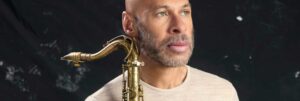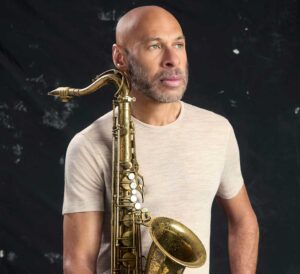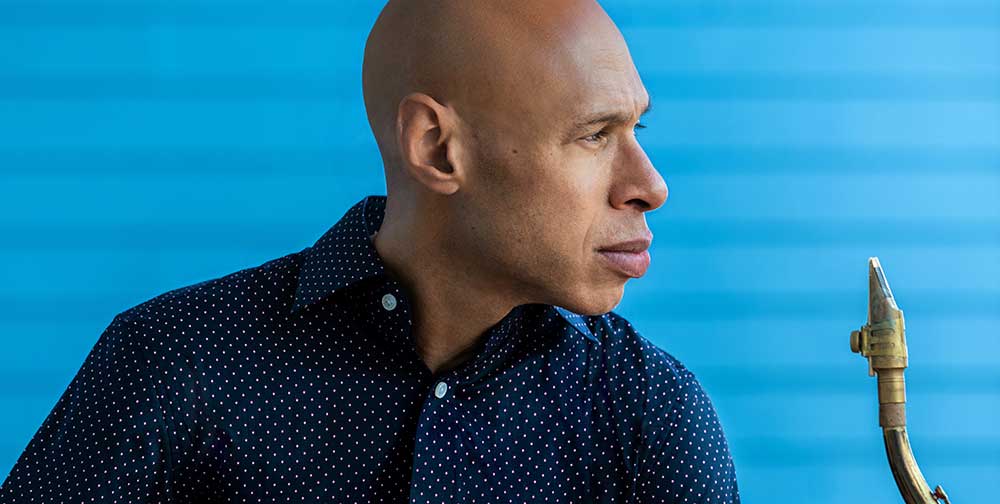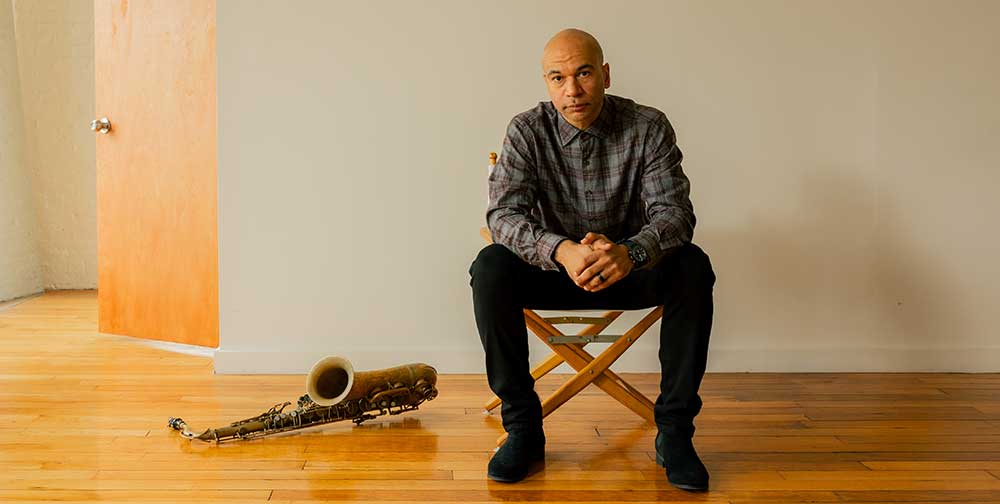There are musicians who allocate time – say, six months or a year – to write an album. Then there are artists so prolific, so filled with music and ideas, that new compositions flow freely, surfacing to find their identity, but not always their home. So, when “something flipped along the way” and it occurred to Joshua Redman that the young working quartet he’d assembled for the world tour behind “where are we”, his 2023 Blue Note debut, was of a calibre beyond his expectations, he knew that A. he had to bring them into a studio, and B. they’d record a set of music he’d created during the rarified quiet of the pandemic.
Poignant, beautiful, hopeful music. Music that – as magicked by Redman, one of jazz’s greatest living saxophonists, composers and band leaders – required animating, needed hearing.
He called this second, oh-so-serendipitous Blue Note album “Words Fall Short”, a title inspired by the book “When Reasons End” by Chinese-American writer Yiyun Li, who, musing on grief and loss, writes: “Words fall short but sometimes the shadows can reach the unspeakable.” More than that is for the listener to decide.
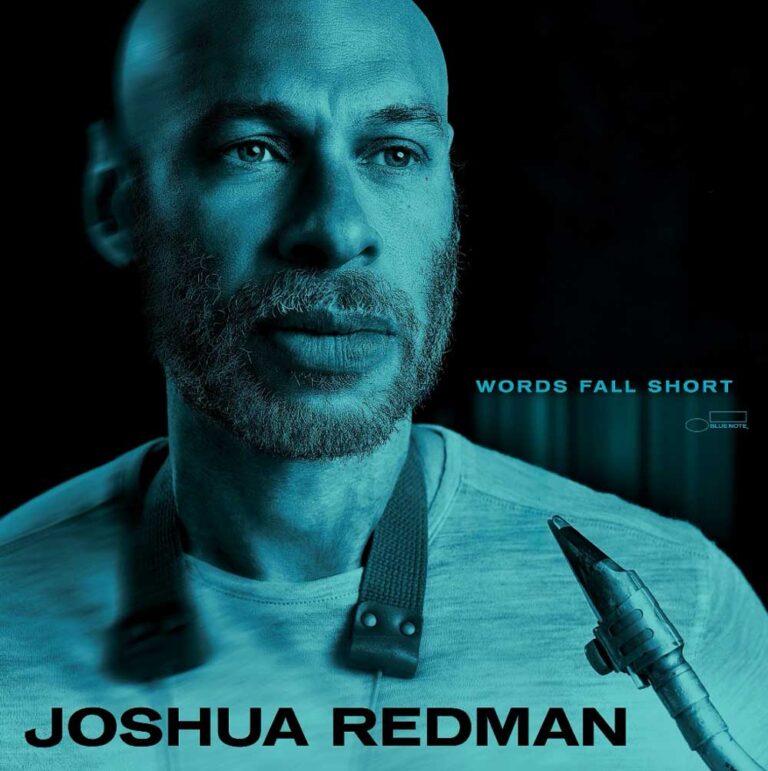
JOSHUA REDMAN Words Fall Short
Available to purchase from our US store.Which makes sense: Redman’s sound, with his signature melting gold tone and quick-thinking improvisations, has long favoured nuance over specifics. When, back in 2023, I asked him for the story behind a track title on “where are we”, his 16th release as an ensemble boss, he paused before replying.
“It has to do with the record emotionally and conceptually but doesn’t make a clear assertion about anything,” said Redman in his erudite, friendly way, seated in his home office in Berkely, California, where he’s sitting again today. “I like to choose titles that are evocative but not definitive,” the former law student, 56, says now. “They don’t just mean one thing.”
“Words Fall Short” might also be viewed in direct relation to his previous project, which found Redman recording with a vocalist and writing lyrics for the first time. But while this new, largely instrumental work also includes a typically airy, delicate feature by the same vocalist, Gabrielle Cavassa (on a single track, “Era’s End”) and similarly luminous supporting guests (tenor sax queen Melissa Aldana on “So It Goes”, rising star trumpeter Skylar Tang on “Icarus”), it’s the organic nature of the album’s development – spontaneous, effortless, needing little verbal direction – that has more resonance here.
“It all came together so fast. I didn’t have a plan to make this record,” says Redman. “We had a run of dates in September last year, and I brought some origjnals to soundcheck. We ran through three in twenty minutes. They all sounded so good that a new album felt right.”
Redman’s new quartet includes a rhythm section of players markedly younger than the maestros (Brad Mehldau, Christian McBride, Brian Blade, etc.) with whom he’s collaborated for many years. Twenty-somethings all, each one blessed with skill and maturity.
There’s pianist Paul Cornish, a Houston-born, L.A.-based musician deemed “one of the most innovative pianists to come along in quite a while” by Blue Note president Don Was, who signed him to the label. (Cornish’s debut album on Blue Note is due imminently.) There’s bassist Philip Norris, a Winnipeg-raised, NYC-based Juilliard School graduate wielding boundary-pushing verve (“Not since Christian McBride can I recall experiencing an acoustic jazz bassist who seemingly has it all together at such a young age,” says Redman), and Philadelphia-born drummer and percussionist Nazir Ebo, whose groove has anchored the likes of Bootsy Collins, Wynton Marsalis and the aforementioned McBride, and whose call-and-response interactions with Redman’s sax are whip-smart and affecting.
“I’m not plugged into the scene like I used to be, but I maintain an active awareness of who’s around,” says Redman. “Empathy, unity and collaborative spirit are the three things I hold most dear as a bandleader. There’s no shortage of individual musicians who can dazzle, but an improvising jazz group is more than just shredding. These guys know how to integrate their individual strengths for the sake of the collective.”
The group’s performance, with Cavassa, on an NPR Tiny Desk Concert in 2024 – Redman is a regular on NPR’s Jazz in America, featuring on episodes including a tribute to his late father, saxophonist Dewey Redman – exemplified the combination of unity and trust, the balance of restraint and complexity, flexed by such a combination of maestros. All of which and more is bottled on “Words Fall Short”, whose eight atmospheric tracks include opener “A Message to Unsend”, at once radiant and melancholy, and an instrumental bookended by “Era’s End”, the same composition in another key, and the only song with lyrics, including a line about “a message to unsend”. “We often wish we could take things back,” Redman says.
Does he see elements of himself in these younger men? “Only in that I was young once, and they’re way better than I ever was,” he quips. “But yeah, there’s that energy, that fire, that quickness to find places in the music to connect, contrast, identify.”
“I don’t feel the age difference when we play,” he continues. “We are all working together, trying to reach the unspeakable, to channel the sense of possibility that will take us closer to the intangible. Words, and even musical notes, can only do so much to capture meaning.”
And the meaning is what, exactly?
Another pause. “That,” he says, “is part of the mystery.”

JOSHUA REDMAN Words Fall Short
Available to purchase from our US store.Jane Cornwell is an Australian-born, London-based writer on arts, travel and music for publications and platforms in the UK and Australia, including Songlines and Jazzwise. She’s the former jazz critic of the London Evening Standard.
Header image: Joshua Redman. Photo: Jen Rosenstein.

